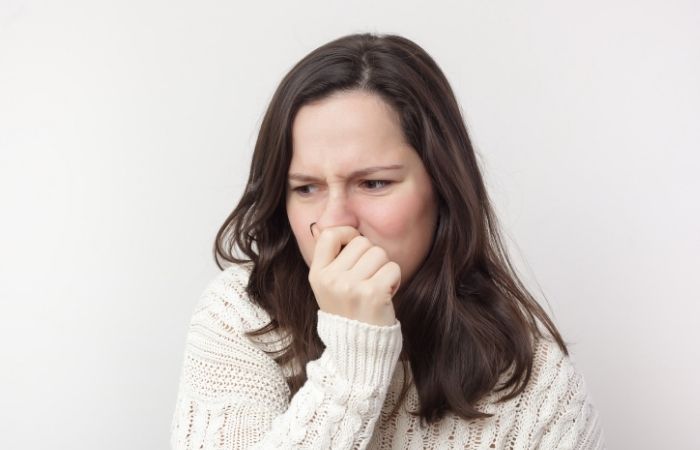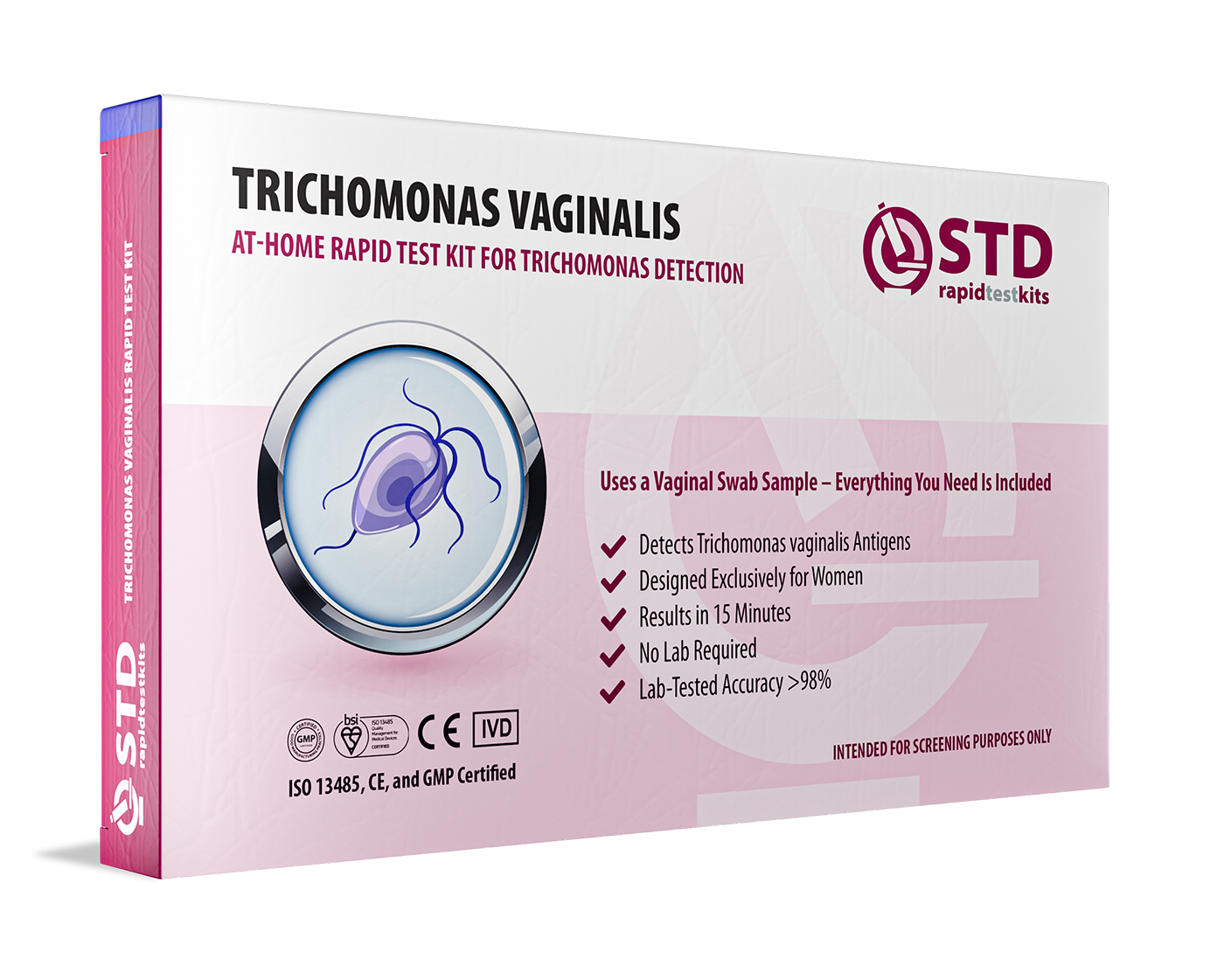Quick Answer: A persistent fishy odor after sex can be a key symptom of trichomoniasis, the most common curable STI. While many people never notice signs, discharge, burning, and odor are classic. At-home tests are over 95% accurate and let you check privately, without the clinic trip.
When a Smell Isn’t “Just a Smell”
Alice, 26, remembers the first time it happened. She and her partner were tangled in bed, laughing, sweaty, half-asleep. Then she went to the bathroom and froze. “It smelled like something rotten, almost metallic, and I panicked,” she recalls. “I thought, oh my god, he’s going to think I’m dirty.” She spent the next week drowning herself in cranberry juice, pantyliners, and body washes that only made it worse. When she finally worked up the courage to get tested, the doctor told her it was trichomoniasis.
Stories like Alice’s aren’t rare. About 70% of people with trich never have symptoms, which means it circulates quietly, often undetected, until one person notices an odor, irritation, or abnormal discharge. Research in the JAMA Network shows that millions of Americans carry it, yet it rarely makes headlines. It’s not as infamous as herpes or chlamydia, but it’s far more common than most realize.
The odor itself comes from the parasite’s effect on the vaginal environment. It disrupts the balance of bacteria, producing volatile amines that smell stronger after sex or during menstruation. That’s why so many people describe it as a fishy or chemical odor that intensifies after intimacy or their period. And while it’s tempting to dismiss it as “just pH,” studies confirm that odor plus discharge is often diagnostic for trich, not just bacterial vaginosis or yeast infection.

People are also reading: How Ignoring Herpes Treatment Can Increase HIV Risk
This Isn’t Just Razor Burn, And Here’s Why
The confusion is understandable. Trich symptoms overlap with other vaginal health issues so tightly that misdiagnosis is common. Yeast infections cause itching, but not usually the strong odor. Bacterial vaginosis causes odor too, but its discharge is thinner and grayish. Trich, on the other hand, can cause a yellow-green frothy discharge, vulvar irritation, and pain with sex or urination, all wrapped in that trademark smell.
Medical sources like the CDC and Mayo Clinic emphasize how subtle the differences are. Even experienced doctors can miscall it without a test. Which is why home testing is such a breakthrough: it puts lab-quality answers in your hands without the awkward stirrups and paper gowns.
And here’s the kicker, men almost never notice. People with penises can carry trich asymptomatically, passing it back and forth for months, even years. That’s one reason women and nonbinary folks so often get blindsided with symptoms first. Partners may swear they’re fine, and they might believe it, but trich doesn’t always leave obvious signs in everyone.
“I Thought It Was Just a Yeast Infection”
Kara, 31, spent nearly six months bouncing between drugstore creams and cranberry pills. Each time she thought she’d beaten the itch, the odor came back.
“I was embarrassed to even tell my best friend,” she admits. “I felt gross, like maybe I wasn’t clean enough.”
It wasn’t until a friend shared an article on trichomoniasis that she realized her symptoms lined up almost perfectly. A discreet at-home kit confirmed what the clinic eventually did: it wasn’t yeast, it wasn’t BV. It was trich all along.
That cycle of self-blame and confusion is heartbreakingly common. A HuffPost feature highlighted how trich gets overlooked, even though it’s the most common curable STI worldwide. Because it doesn’t always flare up right away, people often mistake it for something less “serious” or assume the smell is just hygiene-related. Stigma silences conversations, leaving people Googling in the dark at 2 a.m., wondering why their body feels like a stranger’s.
Check Your STD Status in Minutes
Test at Home with RemediumTrichomoniasis Test Kit

 For Women
For Women Results in Minutes
Results in Minutes No Lab Needed
No Lab Needed Private & Discreet
Private & DiscreetOrder Now $33.99 $49.00
When Silence Makes It Worse
Let’s be real: vaginal odor is one of the most stigmatized health concerns out there. People whisper about it in bathrooms, swap questionable remedies on forums, and spend billions on “feminine washes” that often make infections worse. But here’s the truth, odor is a symptom, not a moral failure. And with trichomoniasis, it’s a symptom worth paying attention to.
Peer-reviewed studies in BMJ’s STI Journal have shown that untreated trich not only lingers, but also increases the risk of acquiring or transmitting HIV. The inflammation it causes makes tissue more vulnerable to other infections. This isn’t just about odor, it’s about protecting your long-term health.
And yet, most people delay testing because they’re ashamed or don’t know home options exist. A survey of young adults found that over 70% preferred home testing, mainly for privacy and convenience. They weren’t avoiding care, they just didn’t want the shame spiral of sitting in a waiting room, convinced everyone was judging them.
The Science of Home Testing, And Why It Works
If you’re picturing flimsy test strips or gimmicks, think again. Modern at-home STI kits for trich use NAATs (nucleic acid amplification tests), the same gold-standard technology used in clinics. A recent Nature Scientific Reports study confirmed that self-collected vaginal swabs are just as accurate as provider-collected ones: sensitivity around 94% and specificity around 91%. In plain language? They pick up nearly all true cases, and rarely give false positives.
Other studies published in PubMed show rapid trich tests hitting accuracy rates above 95%. That means you can trust the result without wondering if your embarrassment bought you a meaningless answer. In fact, some FDA-approved combo kits screen for trich, chlamydia, and gonorrhea all at once, letting you rule out multiple culprits with one swab.
What’s powerful here is choice. You can test quietly at home, get clear results, and then bring those results to a healthcare provider for treatment. No awkward explanations, no “feminine odor” products pushed at you, no stigma, just data that backs up what your body has been trying to tell you.
Myth-Busting the Biggest Questions
“Only people who sleep around get trich.”
False. Trich spreads through vaginal, anal, and sometimes oral sex, and even a single encounter can transmit it. Monogamous couples can discover it years later, because one partner carried it silently all along.
“If I don’t have symptoms, I’m fine.”
Not true. Studies from the World Health Organization show that 70–85% of people never show signs, but can still pass it to partners. Asymptomatic doesn’t mean harmless.
“It means my partner cheated.”
Also not necessarily true. Because trich can lie undetected for months or years, its appearance doesn’t prove recent infidelity. It simply means someone carried it without realizing, and the balance finally tipped into symptoms.
“You can wash it away.”
No. Over-the-counter washes and douches not only fail to cure trich, they can disrupt vaginal flora and make symptoms worse. The only cure is prescription medication: metronidazole or tinidazole, usually in a single dose.

People are also reading: How HPV Can Lead to Anal Cancer: Prevention and Early Detection
What Happens After the Test?
So let’s say you take the leap, order the at-home kit, and the result flashes positive. The next thought is almost always panic: Now what? Does this mean I’m broken? How do I tell my partner?
Here’s the reality: trich is one of the most straightforward infections to treat. Prescription antibiotics, most often metronidazole or tinidazole, wipe it out in a single dose for the majority of people. Sometimes providers prescribe a longer course if symptoms are stubborn, but the cure rate is consistently high. Unlike herpes or HPV, there’s no “forever” factor here. It’s an infection, not a life sentence.
What complicates it isn’t the biology, it’s the silence. Because trich can hide in partners without symptoms, treatment has to be a team effort. If only one person takes medication, the infection will boomerang back within weeks. That’s why the CDC and Planned Parenthood both stress: partners need to be treated at the same time, even if they feel fine. That’s not betrayal. That’s biology.
Breaking the Shame Cycle
Devon, 29, remembers sweating through the conversation with his girlfriend.
“I thought she’d accuse me of cheating,” he says. “But she just shrugged and said, ‘Then we’ll both get treated.’ It was such a relief.”
Their story underscores what countless others have found: testing isn’t an accusation, it’s an act of care. Framing it that way can change the whole emotional landscape.
In queer and non-monogamous communities, routine testing is already normalized as part of safer sex. The stigma shifts when testing is framed not as proof of “dirtiness,” but as routine maintenance, like dental cleanings or Pap smears. Imagine if we talked about vaginal odor with that same matter-of-fact tone. Imagine if testing wasn’t whispered about, but casually discussed at brunch, like switching birth control or buying lube.
How to Protect Yourself, and Your Partners
Testing is step one. But preventing re-infection and protecting your body long-term means building habits that don’t rely on shame or luck.
That means: using condoms and barriers during sex, especially with new or multiple partners. It means getting tested regularly, not only when something feels “off.” It means having the uncomfortable conversation with partners, and reminding yourself that awkwardness is temporary, but untreated infection lingers.
And here’s where sex positivity matters. Preventing trich doesn’t mean shutting down pleasure or avoiding intimacy. It means weaving safety into your sex life so that intimacy feels more secure, more intentional, and ultimately, more enjoyable. That is the opposite of shame, it’s empowerment.
Your Private Path to Answers
Maybe you’re still hesitating, worried about the logistics. Here’s the truth: at-home trich tests aren’t just a clinical shortcut, they’re a lifeline for people weighed down by stigma. You can get your kit online, get tested, and get answers, all in complete privacy. Many tests screen for multiple infections at once, giving you a clear picture of your sexual health.
This isn’t about “catching” someone. It’s about ending the guessing game, taking back your agency, and protecting your future. As the Lancet highlights, trich remains under-diagnosed globally because people underestimate their risk. At-home testing is one of the tools changing that reality. Peace of mind really is one test away.
Check Your STD Status in Minutes
Test at Home with Remedium10-in-1 STD Test Kit

 For Women
For Women Results in Minutes
Results in Minutes No Lab Needed
No Lab Needed Private & Discreet
Private & DiscreetOrder Now $189.00 $490.00
For all 10 tests
FAQs
1. Does a fishy smell always mean I have trich?
Not always. Sometimes it’s bacterial vaginosis, sometimes it’s just your natural pH shifting after sex or your period. But if that smell hangs around, especially with itching or funky discharge, trich is a top suspect. The only way to know for sure is testing, guessing just leads to anxiety spirals.
2. Can guys really carry trich and not know it?
Yep. Wild, right? Most men don’t notice anything, maybe a little irritation, maybe nothing at all. But they can still pass it along during sex. That’s why it can feel like the world’s rudest “gift” in relationships. It’s not about blame, it’s about biology.
3. How long can it stick around?
Longer than you’d think. Months. Years, even. That’s why people sometimes discover it in long-term relationships and assume the worst. Truth is, one of you could have picked it up ages ago and never known.
4. Can it go away if I just wait it out?
Sorry, nope. Trich doesn’t magically pack up and leave. It sticks around until antibiotics show it the door. The good news? One round of meds usually does the trick.
5. Yeast, BV, trich, how do I even tell the difference?
Think of yeast like cottage cheese discharge and relentless itching, BV like a thin gray flow with odor, and trich as that strong, almost metallic fishy smell with frothy yellow-green discharge. They overlap, which is why tests exist, your nose alone isn’t a lab.
6. What about oral sex, can I get it that way?
It’s rare, but possible. The parasite thrives in genitals, not mouths, but if you’re mixing fluids, there’s a slim chance. Condoms and dental dams keep things fun and less stressful.
7. Will trich mess with my fertility?
Untreated trich can increase the risk of pelvic inflammatory disease, which can affect fertility. That’s why ignoring it is a gamble you don’t need to take, treatment is quick and cheap compared to the “what ifs.”
8. How good are at-home tests, really?
Better than you’d expect. The science behind them is the same as what your doctor would order, NAATs, if you want the fancy name. Studies show they’re above 95% accurate. If you can swab your nose for COVID, you can swab yourself for trich.
9. Is trich connected to HIV?
Unfortunately, yes. The inflammation trich causes makes it easier for HIV to enter the body and harder for the immune system to fight. That’s another reason not to ignore it, it’s not just about smell, it’s about overall sexual health.
10. Do queer folks get trich too?
Absolutely. Anyone with genitals that touch other genitals can get it. It doesn’t care about labels, straight, gay, bi, nonbinary, it’s equal opportunity. Which is why queer-inclusive, judgment-free testing is so important.
You Deserve Answers, Not Assumptions
That strange smell after sex isn't a joke; it's your body telling you something. You deserve to know what's going on without feeling ashamed, whether it's trich, BV, or something else. Trichomoniasis is common, treatable, and often doesn't show any symptoms. The infection itself isn't what makes it dangerous; it's the silence that surrounds it.
Sources
1. Mayo Clinic – Trichomoniasis Overview
2. Planned Parenthood – Trichomoniasis
3. WHO – Trichomoniasis Fact Sheet
4. BMJ STI Journal – Advances in Diagnostics for Trichomoniasis
5. Nature Scientific Reports – Self-Collected Swabs Accuracy










